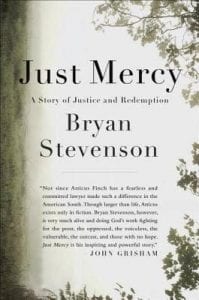 By Neeley Gossett (ngossett1@gsu.edu)
By Neeley Gossett (ngossett1@gsu.edu)
During the fall 2016 semester, I assigned my English 1101 classes to write personal narrative essays about social injustice. My inspiration for one of the assignments came from the Alliance Theatre’s Collision Project.
“For three weeks each summer, the Alliance Theatre assembles a diverse group of 20 teenagers from metro Atlanta to explore and unpack a classic text under the guidance of a professional playwright and director. Through improvisational exercises, oral history, choreography, the individual performing talents they possess, and their writing, the teenagers create a new piece inspired by the classic text but perceived through their own utterly unique and contemporary prism” (Alliancetheatre.org).
During class, we listened to a portion of Bryan Stevenson’s Just Mercy audiobook. In the particular chapter I chose, Stevenson parks his car in the Atlanta neighborhood, Virginia Highlands, two police officers unlawfully detain and search him. Students “collided” with Stevenson’s text, using the modified version of Alliance Theatre’s Collision Project method to write an essay about their own experiences with and perspectives on social injustice.
Another essay option was to write about why they had not faced social injustice. A few students wrote about racial or economic privilege. One African-American student wrote a particularly compelling essay about being a part of a closely connected community in which his grandfather was the pastor, and he played high school football. Because he was well-known in the community and had never lived outside of it, he had not experienced injustice.
In anticipation of some students resisting the idea of social justice all together, I also offered them the choice of writing an illustrative essay arguing against the concept of social injustice, but no one chose this option.
The following quotes are from students’ essays.
An undocumented student:
“Watching my fellow peers apply for Colleges and Scholarships gave me motivation to begin my process. As I reached the end of many college applications and scholarship submissions, I received “invalid information” where they wanted me to enter the Social Security number that I never had. “I realized that having good grades did not matter because my education was limited, unlike any other student who are residents in the country.”
A student in a wheelchair:
“During my life, I have been to places that are not wheelchair accessible, and it’s hard to go to these locations. I sometimes might not be able to go into these places because of my disability.”
A student whose mother is an undocumented immigrant and was detained by the police:
“She tried to explain that back in 1993 a social security number was not needed, but he ignores her response and mumbles a racist comment under his breath, ‘This Wetback.’ He did not return her license but instead tells her to get one at the DMV. He then darted off with her license in her possession. ‘Now how will I get to work?’ my mother cried.
A student whose mother is a convicted felon:
“She had been sentenced to 14 years of probation…but she continues to be restricted from a lot… She faces problem applying for school along with applying for almost anything. The question that separates her the most from the norm group is her criminal record.”
A student from Indonesia:
“Before we can enter the United States, we have to apply for Visa in the US embassy in our country. After applying, we have to go to the embassy to do an interview… They asked me why I wanted to study in the United States and at the school I chose and what I was planning to study. All of a sudden, they started asking about my religion.”
Twitter Project
In addition to the narrative essay, students posted newspaper articles about social justice and injustice on Twitter using #Justthink throughout the semester. Another class also posted links using the same hashtag. This allowed them to share ideas with each other and people outside of the class. They explained and discussed their articles in class and used Twitter and #Justthink to build a sort of “database” of articles that they then used to choose the seminal idea for their research papers, which were on a contemporary social justice topics. Students often posted articles about Black Lives Matter and the University System of Georgia’s ban on undocumented students. Because of social media activism, I feel it is important to include social media when teaching social justice.
Some students found the assignment helpful to their research paper, but others were frustrated because they felt that using the articles to begin their research limited their topic choices.
Survey
I conducted a causal, anonymous survey on the last day of class in order to evaluate my own effectiveness when teaching social justice. The results of two of the questions are below.
Works Cited
“Palefsky Collision Project.” Alliance Theatre. The Alliance Theatre, 21 Feb. 2013. Web. 23 Mar. 2016.



